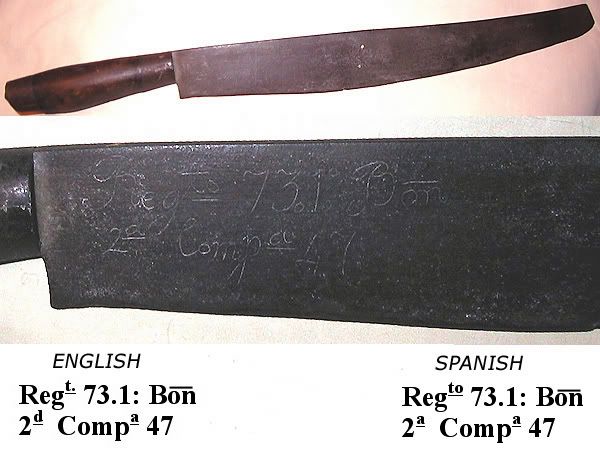
 |
|
|
|
|
#1 |
|
Vikingsword Staff
Join Date: Dec 2004
Location: The Aussie Bush
Posts: 4,655
|
I posted this one over on the SFI military swords site, only to be told that what I thought was an inscription in English was most likely Spanish.
http://forums.swordforum.com/showthr...threadid=49980 Moreover, the knife is not a standard military pattern and it was suggested that I consider Latin America or another Spanish colonial area of influence, including the Philippines. So what do you guys think? Description This is an old knife that I purchased recently from a dealer in the US. He found it in an estate. The blade is heavy and has been used in the remote past, with evidence of sharpening and loss of metal in places along the edge. The blade is sharpened on one side only, with the back being flat and the edge on the face being rounded rather than beveled (not exactly a chisel grind). Definitely a hand forged blade and not an armory production -- no stamps or maker's marks. The handle is wood with an iron ferrule either end. The hilt is full tang, and the tang is peened over a small butt plate. The handle has an ovoid cross section, with quite a prominent ridge running along the underside. OAL 19.5 in. Blade 14.25 in. A faint, hand-engraved inscription on the blade is difficult to make out (see picture) but I believe it indicates: Regiment 73.1 2nd Battalion Company 47 The style of hand writing strikes me as 19th C. or earlier. Pictures Juan Perez over on SFI made this comment: "In case it helps, I'd say that the inscription is written in Spanish. Therefore you can find Regto (=Regimiento), Bón (=Batallón), 2ª (=segunda) and Compª (=Compañía), which has of course the same meaning you have pointed out before." The Spanish version has been added at the bottom of the pictures, along with my original English interpretation. Any ideas when and where this knife may have originated? Ian.  |
|
|

|
|
|
#2 |
|
Member
Join Date: Dec 2004
Location: B.C. Canada
Posts: 473
|
Hi Ian,
I saw this on the SFI site. It screams Phillipines to me. Since I know you know way more about these weapons, what is it that makes you think it is from elsewhere? Jeff |
|
|

|
|
|
#3 |
|
Vikingsword Staff
Join Date: Dec 2004
Location: The Aussie Bush
Posts: 4,655
|
Hi Jeff:
I am trying not to jump to any conclusions about this one, and keep an open mind. The full tang hilt does not seem "right" for a Luzon knife, with a ferrule at either end and an ovoid cross section to the wooden handle, and the blade is flat on one side with an edge grind on the other (but not like a Visayan chisel grind). It could be from the Philippines -- perhaps Span-Am War period or earlier -- but I'm being cautious. Ian. |
|
|

|
|
|
#4 |
|
Member
Join Date: Dec 2004
Location: B.C. Canada
Posts: 473
|
Thanks Ian, I knew there had to be something specific. HeHe... when i saw the SFI post I almost automatically posted a referal here with the idea that you or the other PI collectors would nail it down, then I noticed who posted. Whew, yet another brush with looking stupid
 . .Jeff |
|
|

|
|
|
#5 |
|
Member
Join Date: Dec 2004
Location: Houston, TX, USA
Posts: 1,254
|
Definitely another "cut point" matulis/balisiong; one with a different handle style. I can't recall; it seems this handle is associated with a certain smaller Visayan or semiVisayan island and parts of Luzon near/related to it? This handle style, with the two ferules, often spiralled, often spiral-wrapped with a wire, often with the odd-looking lopsidedness seen here, is quite distinctly a tradition of its own, more Euro- than the various hoof modified shapes, IMHO, and usually thought of as circa 1900, with a leaning toward the earlier, rather than later part of circa 1900............almost more up to 1900 than circa 1900, I guess, though not too far back into the 19th, either, AFAIK.
|
|
|

|
|
|
#6 |
|
Vikingsword Staff
Join Date: Dec 2004
Location: The Aussie Bush
Posts: 4,655
|
Thanks Tom.
In a previous post about a similar cut point knife, I think you indicated that the cut point was used to indicate a non-military or "non-aggressive" use. Here we seem to have a military knife with this "non-aggressive" feature. That seems odd. I am also going to suggest that this style is not a traditional Philippine trait in weapons making, but more likely a Spanish influence and thus could be found elsewhere in other regions under Spanish control. To give it a local Filipino name such as a cut point matulis/balasiong does not mean that it would necessarily be unique to the Philippines -- perhaps we just recognize it better there because we have more familiarity with the Filipino weapons than, say, those of Mexico, Cuba, Central or South America. I think that is what Juan Perez was implying in his reply on the other forum. As a person with a good eye for how edged weapons are made, what do you think of the forging of this blade with a flat back (reverse side) and a curved front (obverse side) ground to the edge. It's not like a Visayan blade at all, which has a typical chisel grind. Also, the handle is ovoid (egg-shaped) in cross-section, with the "thin" section running along the underside of the handle were there is quite a "ridge" for the fingers to wrap around. This is unlike the usual Flipino hilt configurations that are based on a round cross section, sometimes carved to hexagonal or octagonal shapes but still essentially of cylindrical design. |
|
|

|
 |
|
|